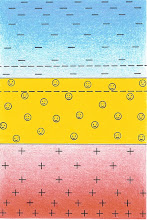The IRS is operating on the controversial area of law known as “civil asset forfeiture”. This allows law enforcement agents to seize property suspected of being tied to a crime, even in the absence of criminal charges. In the cases reported in the article, the people fall under suspicion by making frequent cash deposits under $10,000. Under the Bank Secrecy Act, banks must report cash deposits over $10,000. Criminals know this, so they try to evade scrutiny by making deposits under this amount. Banks are also supposed to report deposit patterns below $10,000. Making frequent deposits under $10,000 with the intent of evading reporting requirements is known as “structuring”, and is illegal.
What if you operate a cash business, and make frequent small cash deposits? There’s nothing illegal about that, right? There may be grounds for an IRS audit, but certainly not justification for the government to seize your money without charging you with a crime. But this is what’s happening.
The article reports on some cases of innocent people whose property was confiscated by the federal government. Carole Hinders has operated a cash-only Mexican restaurant in Iowa for almost 20 years. She deposited her earnings at a small bank branch. The IRS seized her checking account, amounting to $33,000, without charging her with any crime. The reason for seizure was that her cash deposits were consistently under $10,000, which the IRS perceived as an attempt to avoid reporting. According to Hinders, “my mom had told me if you keep your deposits under $10,000, the bank avoids paperwork. I didn't actually think it had anything to do with the I.R.S.”
In Long Island, owners of a family-run candy and cigarette distributor named Bi-County Distributors made daily cash deposits between $5,000 and $10,000. Investigators were able to obtain a seizure warrant based solely on the pattern of deposits. The federal government seized $447,000 from the business 2 years ago. The business owners have not been charged with any crime. The government has made settlement offers to the owners that require that they surrender a large chunk of the money seized. Jeff Hirsch, one of the owners, said that “We’re just hanging on as a family here. We weren't going to take the settlement, because I was not guilty.”
Army sergeant Jeff Cortazzo of Arlington, VA, saved for his daughters’ college costs by making small cash deposits from his paychecks at a bank. The government seized $66,000. His settlement to get back his money cost him $21,000, almost 1/3 of his money. As a result, his oldest daughter had to delay college by a year.
These three examples include business owners and individuals who haven’t been charged of any crime. Their property was confiscated by the federal government for the sole reason that they made frequent cash deposits. This is completely un-American, a violation of the rule of law, and the rule that you’re innocent until proven guilty. The federal government simply stole these people’s money, and extorted them a large percentage to get the money back.
Civil asset forfeiture was supposed to be only used against drug dealers, racketeers, and terrorists. Clearly whatever flimsy rationale for this law has been undermined by the federal government’s recent behavior. I don’t see a reason to seize assets of people who have not been convicted of a crime. I fully support severe penalties against people convicted of drug dealing, racketeering, and terrorism. These penalties should include asset forfeiture. But the seizure of assets of innocent people whose only “crime” is that they made frequent small cash deposits is simply expropriation. We’re talking about something that Fidel Castro or another petty dictator could get away with. This is not something that we should accept in the United States.
In this election season, let’s make it clear to our federal representatives and candidates running for office that we will not tolerate federal government expropriation of the property of people who are innocent of any crime. Misguided laws allowing confiscation of private property of innocent people need to be repealed.
